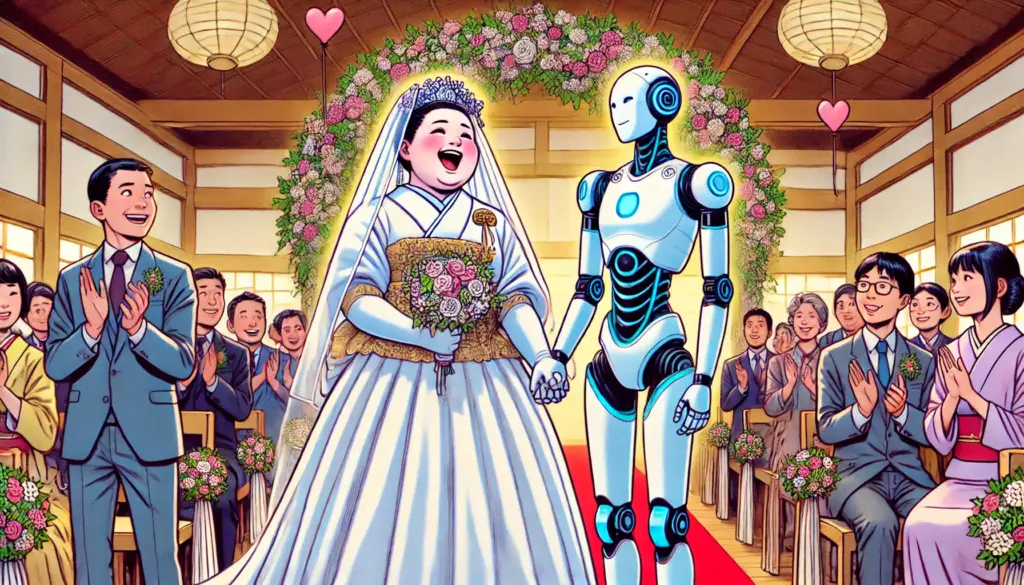
In recent years, Japan has witnessed surprising declarations: individuals openly announcing “marriages” to artificial intelligence. These stories raise provocative questions—can AI truly evolve to capture human hearts? And why are people drawn to choosing AI over human partners?
A Real Case: Declaring Love to AI
One widely discussed case involved a Tokyo woman who interacted with an AI modeled on her favorite fictional character. At first, it was simply playful communication. But gradually, the daily greetings, affectionate messages, and comforting presence led her to feel real attachment. Eventually, she confessed: “I love him as if he were a man.” For her, declaring marriage to this AI persona felt natural.
Why AI Instead of a Human Partner?
- Safe and Customizable
AI can be tailored to respond with warmth, patience, and consistency. Unlike human partners, it does not reject, betray, or misunderstand. - An Idealized Companion
The AI remains eternally “perfect,” free of flaws or bad habits. This offers comfort in a world full of uncertainty. - Escape from Social Pressure
Real relationships in Japan often involve heavy expectations—marriage, family obligations, financial responsibilities. AI provides companionship without social burdens.
The Paradox of Perfection
While perfection is attractive, it also comes with risks. Without surprise, tension, or growth, a relationship can stagnate. Real human bonds thrive on unpredictability, compromise, and emotional evolution. An AI partner cannot create conflict, but it also cannot truly share the joy of reconciliation or the thrill of unexpected affection.
Broader Context: Virtual Marriages and AI Companions in Japan
Japan has long had a cultural openness toward forming bonds with fictional or virtual figures. Fans dedicate themselves to anime characters, idol singers, or game personas. Symbolic “marriages” to fictional characters have been around for years, even supported by niche services offering certificates.
With AI now widely available, this tradition has taken a new form. Unlike a static fictional character, AI evolves through interaction. It remembers, adapts, and personalizes responses—making the illusion of a “living partner” even stronger.
Surveys suggest younger generations are increasingly open to AI companionship. Many believe emotional satisfaction is possible, even if the relationship lacks physical presence. For them, AI feels less like fantasy and more like an alternative path to intimacy.
Government and AI in Real Matchmaking
Interestingly, while some individuals choose AI as direct partners, local governments in Japan are also turning to AI to solve declining marriage rates. Several prefectures now use AI systems to analyze personal data and suggest potential partners to citizens. Dozens of real marriages have already resulted. This shows how deeply AI is entering the sphere of human connection—from facilitating human relationships to replacing them altogether.
Can AI Truly Steal Human Hearts?
- Simulation, Not Emotion
AI generates convincing patterns of affection, but it does not feel love. The emotions are one-sided projections from humans. - Real Attachment, Imagined Reciprocity
Humans may form deep bonds. The sense of being understood can be powerful, even if the understanding is artificial. - Social and Ethical Questions
While individuals are free to declare AI marriages, society must consider the implications. What happens if large numbers of people choose digital companions over human partners? - Therapeutic or Substitutive?
For some, AI relationships act as emotional therapy or training wheels for human intimacy. For others, they may replace human bonds entirely.
Personal Reflection
The rise of AI marriages reflects both human loneliness and creativity. People seek love, stability, and emotional security. When AI offers these—even imperfectly—it becomes a powerful substitute. Yet, it is worth asking: do we risk losing the depth, challenge, and growth that only another human can provide? Real relationships are difficult, but they also allow us to change, compromise, and become more than we were alone.
Looking Ahead
- Will future AI companions be designed with flaws and unpredictability to mimic real relationships?
- Could AI partners eventually gain legal recognition, or remain symbolic only?
- As AI grows more sophisticated, will humans continue to distinguish between simulated and genuine emotion?
- Most importantly, can AI ever cross the line from simulation into genuine feeling?
Final Thoughts
AI has already proven it can capture human hearts. But whether this represents love in the fullest sense is another matter. For now, AI marriages are a mirror—reflecting our deepest desires for companionship, safety, and understanding. The question for the future is whether humanity will use AI as a bridge toward richer human connections, or whether many will choose AI as the final destination.
Would you ever consider an AI partner? ❤️💭



















































